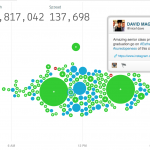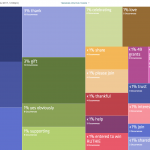
A Bowdoin alumna tweeted this on April 20. We saw the post and responded. Check the photo gallery below to see what happened.
When you think about uses for social media, what pops to mind first? Sharing photos on Instagram or Facebook? Reading news on Twitter? If you’re a business or organization, perhaps it’s increasing the number of your followers, improving engagement, or sharing news and information. But, beyond information sharing, one of the more important and valuable aspects of social media is listening.
Social listening is the process of searching all public online sources (including social media) for mentions and conversations of interest to you. [Source: Social Listening Belongs in the Modern Marketer’s Toolbox]
Social listening is the process of searching all public online sources (including social media) for mentions and conversations of interest to you.
If a tree falls in the forest and no one is there to hear it, does it make a sound?
The answer is a resounding yes! Whether or not we’re there to hear it, conversations about Bowdoin are happening on the internet all the time. Social listening allows us to conduct sophisticated searches across millions of online sources to learn what people are saying about Bowdoin or other topics we are interested in analyzing. And it’s not just social media that’s being searched, specialized software allows us to also scan blog posts and comments, news articles, forums, review sites, and more.
Understanding what people are talking about in regard to Bowdoin (or another related topic of interest) gives us an ability to not only understand our reputation, but also provide customer service when the opportunity arises.
Understanding what people are talking about in regard to Bowdoin gives us an ability to not only understand our reputation, but also provide customer service when the opportunity arises.
Alumni or students may be sharing their opinions about the Bowdoin experience. Prospective students and their parents may be discussing a campus visit. The academic community or media may be sharing news about Bowdoin and the role of a liberal arts education. Or, someone may be expressing a legitimate concern or need. All of these conversations are opportunities that shouldn’t be missed.
In some cases, we may decide to join in a conversation, answer a question, provide information, or simply keep an eye on an issue that could spiral into a potential crisis. Custom alerts can be created to notify us when a burst of negative conversation appears. Social listening can also be used for market research to understand popular or trending topics that can be useful in developing content strategies that will resonate with your audiences.
How does Bowdoin use social media listening?
- Listening for conversations and topics that involve Bowdoin. What are they about? Are they positive or negative?
- Monitor the reach and sentiment of campaigns, such as #bowdoinoneday
- Receive alerts for potential issues of concern.
- Respond to questions and comments about Bowdoin.
- Gather social media data to assist with academic research
- This visualization show discussion about Bowdoin during the 2017 Commencement. Green indicates positive sentiment, red is negative and blue is neutral. The size of the circle represents reach.
- Social listening can help us understand keywords and sentiment around a campaign such as BowdoinOne Day 2017.
- An alumna tweeted about wanting a polar bear Lego. We saw her post (because of social listening) and contacted the Office of Annual Giving. She tweeted her response shortly thereafter.
If you’re interested in learning more about social listening, including use possible academic research uses, please contact Holly Sherburne.


